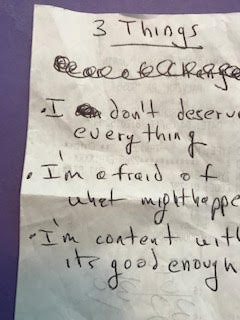
Belief: an acceptance that something exists or is true, especially one without proof.
Our beliefs are powerful. We look through them like they’re a clean window- not always noticing them, but they’re there, nonetheless.
For example, We drive off in our cars, believing we will be safe. We believe the take out food we eat is clean. We believe a tree branch won’t fall on us when we walk in the woods.
Beliefs give us hope, meaning, and safety in an unpredictable world.
They can also sabotage us.
I learned something about my beliefs a few years ago, and it changed the course of my entire life.
Four years ago, I was a successful sales executive living comfortably in suburbia. I had engaging hobbies, traveled extensively to exciting places for my job, had good friends, and was quite satisfied with most of my life.
I was married, and I knew something was missing. This isn’t that bad. There are good things about it. I may not be thrilled, but I have a lot of freedom to do what I want, and that’s good enough for now.
The relationship had gone flat years before-tolerance, and convenience crept in replacing real caring and genuine love. My unhappiness would leak out in criticism and complaints. Hers came out in bursts of anger and, “I can’t take this anymore!”
I didn’t have an affair but secretly wished that I could-imagining that warm rush of adrenalin would give me some kind of relief. I got that buzz I needed in other ways, some healthy and some not good for me.
During this time, I had a knee injury and went to a cryotherapy office for treatment. While waiting for my appointment, a guy walked by and overheard my conversation with the therapist about my knee.
He stopped and asked if he could speak to me. Permission granted. He said, “From a mind-body connection point of view, your knees represent your ability to move forward. Here’s my card, if you’d like to discuss it more, give me a call.”
I was stunned.
I’d been asking myself for years, Why am I not doing something about my dissatisfaction with my marriage? Why am I behaving the way I am? If I want something else, I know I have to end this.
I realized I was stuck, not moving forward. My right knee was injured, and my body was telling me something. It was time to listen to it.
I called the guy, Brian, a health and wellness coach. He carefully listened as I told him that I was afraid to open up an honest conversation with my wife because of what it would unleash- an undoing of a 10-year relationship.
He said, repeat after me, “This is going to be fun and easy.” I thought to myself, no way. I mumbled the words, and they barely made it out of my throat. He said, “Say it again!” I did, and this time they came from deep in my belly. He asked me to write down what I believe about my current situation. This is what I wrote: I don’t deserve everything. I’m afraid of what might happen. I’m content with it’s good enough.

Later that day, I was on my knees, in tears praying to the higher power for help. I can’t take this any longer. I can’t live with myself for not being honest with myself and my wife. I know I can’t have what I want if I don’t end what I currently have.
When I looked at what I had written on that scrap of paper, I realized that those beliefs were running my life.
I don’t deserve everything– Well, that’s a real deal killer. I won’t ever have what I want if I continue with that losing attitude.
I thought about this and concluded that I do deserve everything, everything that is possible for me, everything that will allow me to have a great life.
What is everything for me? Living peacefully and happily. Having a loving relationship. Good health. Engaging, meaningful work, and no financial worries. Don’t we all deserve that?
I’m afraid of what might happen–My wife will get upset. The divorce will be messy. I won’t have enough money. As I went through the divorce, every single one of those false beliefs never happened, but they had kept me in an unfulfilling relationship, a somewhat pleasant suburban jail cell, for quite a few years.
I’m content with it’s good enough- I’d given up on the possibility of having a loving and connected relationship. I’m settling for average. When I realized that, I was shocked at how far away from myself, I had gotten. I’ve never been about “good enough,” but there I was settling for convenience, convincing myself the nice chain restaurant I was in was actually fine dining. I’m not content with good enough. I want great.
A few days later, I spoke to my wife, and while I wouldn’t say it was fun and easy, it wasn’t nearly as difficult as I imagined it to be. She understood as well as can be expected and said. “Look, I’ve always wanted you to have a great life, and if this is what you want, okay.” We separated, began a mediation process, and soon divorced.
Here’s what I’ve learned:
- Do the inner work
I needed to uncover my significant limiting beliefs to rediscover who I was. Simply noticing and acknowledging my beliefs brought them out of my subconscious into my everyday awareness. I paid attention to the “window.” That began the transformation process.
When I finally hit bottom, I found the raw humility and thirst within me to ask for help, and I mean sincere gut-wrenching prayer. I knew I was on the threshold of significant change.
Coming back to wholeness called for a better understanding of my shadow, that part of me that I have suppressed and not accepted. I reread Robert Johnson’s book, Owning Your Own Shadow. He describes the shadow as “that part of us we fail to see or know.” I took long reflective walks and spent time with a therapist, a wise elder.
I had to face the fact there was and is a dark side to my personality, a part I didn’t want to admit was there. I’d kept it at a distance, secret and hidden and guilt-ridden about its existence, saying to myself, I’m better than that. I ‘ll ignore it and it will go away. Just beginning this work of acceptance had a significant impact on my feeling of self-worth and dignity.
I continue to do shadow work and find that the more I do it, the cleaner and freer I become.
2. The power of visualization and affirmations
Visualization and affirmations are recognized practices that help manifest intentions and goals. Athletes and many successful people have been using visualization techniques for years to improve performance. I was skeptical at first, but having practiced both visualization and affirmations for a few years, I see the results. My life is filled with more richness and peace than ever before.
During my ten year marriage, I learned what I didn’t want in a relationship and what I did. What kept coming to me was: I want a strong, powerful, loving woman who knows herself and is connected to spirit. I was visualizing what I wanted, without being fully aware of it.
There are many visualization resources available. Jack Canfield, the author of the Chicken Soup for the Soul series, has information here.
3. Know and live your values
My four core values are integrity-being proud regarding how I behave, response-ability– owning the choices I make, humility– having a curious mindset and respect for others– being kind.
I overlooked my values for some time, and my inner peace suffered greatly. Living fully in alignment with my highest values again is bringing me much needed satisfaction and contentment. No matter what happens, I know now, more than ever before, that my values are my foundation and anchor.
Identifying your core values is a critical step in having the life you want.
4. The importance of connection
I learned that the fundamental breakdown in my marriage was the lack of connection. While my wife and I enjoyed many things together like cooking, sex, socializing, and traveling, we didn’t share spiritual comradery. For many couples, this is not an issue. For me, it is. I overlooked the importance of that when we got married. That was my mistake.
What developed in the absence of a meaningful connection were addictive behaviors that didn’t serve me well.
Robert Weiss Ph.D. writes in Psychology Today “that addiction is not about the pleasurable effects of substances; it’s about the user’s inability to connect in healthy ways with other human beings. In other words, addiction is not a substance disorder; it’s a social disorder.”
5. Timing is everything
For a while, I was frustrated with myself for not doing anything. I realize now the timing for all of this to happen wasn’t meant to be until I was ready. I had to hit bottom. I had to find the motivation within me to do something. When I accepted, instead of rationalizing it all away, that I wasn’t living my life congruently, I opened myself to the possibility of making the change.
Resolution
A few months later, I traveled to Scotland on business, attending a company meeting, assigned to sit in a specific chair at a table with four other people. There was a woman to my left, whom I did not know.
During a break, we struck up a conversation. I told her my story, and she took it all in with a knowing smile. I learned that she had been on her own journey since her divorce and had just completed a women’s ceremony two days prior, asking her guides, spirits, and angels to send her the man she needed.
As she spoke, I found myself gazing into the eyes of a powerful, loving woman, grounded in self-knowledge and spirit.
I was home.
We’re now married, living in a small village in northeast Scotland, continuing to learn how to be better lovers and better humans with each other and with the world around us.
Oh, and the addictive behaviors? They disappeared as soon as I met her like they never existed.
First published on Medium

